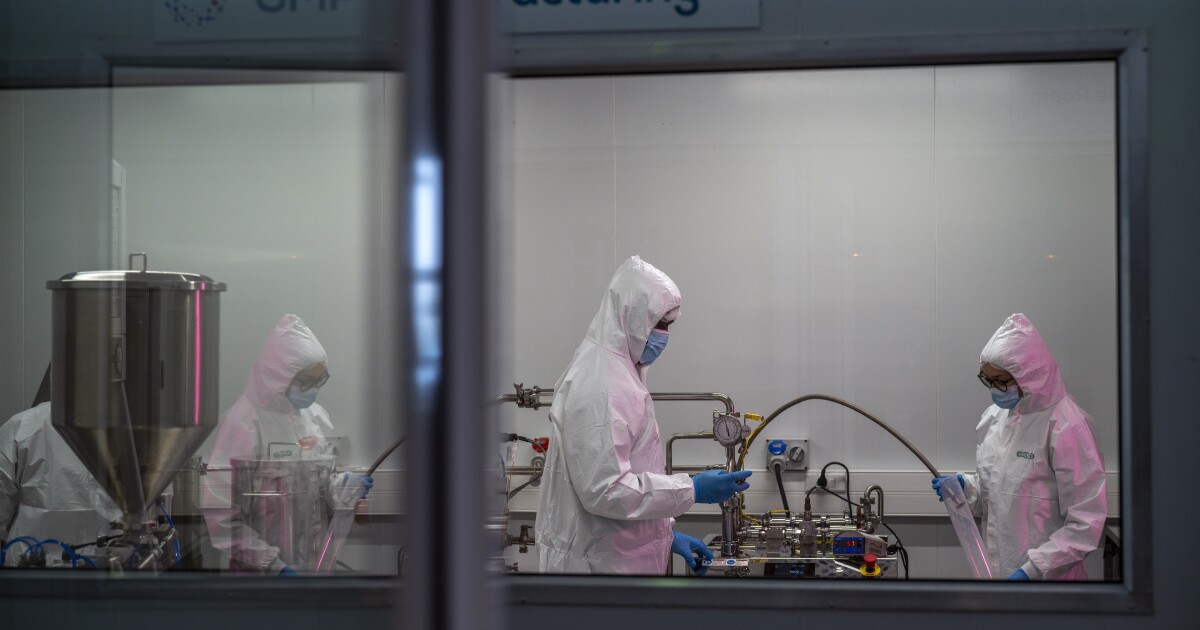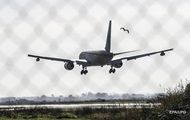CAPE TOWN, South Africa (AP) – In a pair of Cape Town warehouses turned into a maze of sealed sterile rooms, young scientists prepare and calibrate the equipment necessary to reverse engineer a coronavirus vaccine that has yet to reach South Africa or the majority of the world’s poorest.
The energy in the sparkling laboratories lives up to the urgency of their mission to reduce vaccine inequality. In their work to replicate Moderna’s COVID-19 vaccine, scientists basically surround an industry that has clearly prioritized rich countries over poor countries, both in sales and manufacturing.
And they do so with the unusual support of the World Health Organization, which coordinates a center for research, training and vaccine production in South Africa, as well as an associated supply chain for crucial raw materials. It’s a last resort effort to produce fixes for the have-nots, and the intellectual property implications are still unclear.
“We do this for Africa right now, and that motivates us,” said Emile Hendricks, a 22-year-old biotechnologist with Afrigen Biologics and Vaccines, the company trying to replicate Moderna’s drug. “We can no longer depend on these great superpowers to come and save us.”
Some experts see reverse engineering – recreating vaccines from bits of public information – as one of the few ways to combat the pandemic’s power imbalances. So far, only 0.7% of vaccines have reached low-income countries and nearly half have gone to rich countries, according to an analysis by the People’s Vaccine Alliance.
That the WHO, which depends on the goodwill of rich countries and the pharmaceutical industry to exist, lead the attempt to reproduce a registered vaccine reflects the extent of the supply gap.
The UN-backed initiative to match vaccine distribution, known as COVAX, has failed to alleviate severe shortages in poor countries. The donated doses that arrive are a small part of what is needed to reduce inequality. Meanwhile, pressure on drug companies to share, including claims by the current US government about Moderna, has not paid off.
Until now, WHO had never been involved in replicating a new vaccine for global use despite objections from its original developers. The Cape Town center aims to expand access to the new messenger RNA technology used in vaccines from Moderna and from Pfizer and its German partner BioNTech.
“This is the first time that we do it at this level, due to the urgency and also because of the novelty of this technology,” said Martin Friede, the WHO coordinator who helps run the center.
Dr. Tom Frieden, former director of the US Centers for Disease Control and Prevention, has described the situation as a world “held hostage” by Moderna and Pfizer, which produce the vaccines deemed most effective against COVID-19. The new messenger RNA process uses genetic information from the coronavirus spike protein and is believed to produce a better immune response than traditional vaccines.
The administration of US President Joe Biden has argued that since American taxpayers largely funded the development of Moderna’s vaccine, the company should scale up production to help supply developing countries.
The global shortage through 2022 is estimated to range from 500 million to 4 billion doses, depending on how many other vaccines hit the market.
“The US government has played a significant role in making Moderna the company it is,” said David Kessler, director of the US program to accelerate COVID-19 vaccine development.
Kessler did not clarify how far the government would go in its pressure on the company. “They understand that we expect it to happen,” he said.
Moderna has promised to build a vaccine factory in Africa at some point in the future. But after asking drug companies to share their prescriptions, raw materials and technological know-how, some poorer countries are fed up with waiting.
Afrigen Managing Director Petro Terblanche said the Cape Town company aims to have a version of Moderna’s vaccine ready for human trials within a year and go into commercial production shortly thereafter.
“We have a lot of competition from big pharmaceuticals. They don’t want to see us succeed, ”Terblanche said. “They are already beginning to say that we do not have the capacity to do this. We are going to prove it to him ”.
If the South African team is successful in making a version of Moderna’s vaccine, the information will be released for others to use, Terblanche said. That plan is closer to the strategy Biden advocated in the spring and which the pharmaceutical industry strongly opposes.
Commercial production is at a point where intellectual property could become a problem. Moderna has said it does not want to take legal action against a firm for infringing on its vaccine rights, but it has also not offered to help companies that have offered to make its messenger RNA vaccine.
Company president Noubar Afeyan said Moderna decided it would be better to expand production than share technology, and plans to deliver billions of doses next year.
“In the next six to nine months, the most reliable way to efficiently make high-quality vaccines is going to be for us to make them ourselves,” Afeyan said.
Zoltan Kis, an expert on messenger RNA vaccines at the British University of Sheffield, said that replicating Moderna’s vaccine is “feasible,” but the task would be much easier if the company shared its expertise. But some procedures are complex, such as sealing the fragile messenger RNA into lipid nanoparticles.
“It is a very complicated cooking recipe,” he said. “Having the recipe would be very, very helpful and it would also help if someone showed how to do it.”
A UN-backed public health organization still aspires to convince Moderna that its plan to bring vaccines to poor countries is off the mark. The Medicines Patent Pool, formed in 2010, initially focused on persuading pharmaceutical companies to share patents for AIDS drugs.
“It’s not about foreigners helping Africa,” said Charles Gore, the group’s executive director, of the South African vaccine center. “Africa wants to empower itself and that’s what this is about.”
At some point, resolving the intellectual property issue will be Gore’s job. The work to recreate Moderna’s vaccine against COVID-19 is protected as research, so a possible dispute would revolve around plans to commercialize a replicated version, he explained.
“It’s about persuading Moderna to work with us rather than using other methods,” Gore said.
The Medicines Patent Pool has repeatedly tried unsuccessfully to convince Pfizer and BioNTech, the first companies to launch an effective vaccine, to share their formulas.
US Representative Raja Krishnamoorthi, one of the congressmen supporting a law calling on the United States for more investment in the manufacture and distribution of COVID-19 vaccines in low- and middle-income countries, said reverse engineering will not go far enough. fast enough to stop the virus from mutating and spreading.
“We must hurry. We must give a sense of urgency, and I don’t see that urgency, ”he said. “Either we end this pandemic or we stumble along.”
Activists allege that the limited amount of vaccines available to poorer countries through donations, COVAX and purchases suggests that the pharmaceutical industry, dominated by Western firms, is dysfunctional.
“The enemy of these corporations is losing their potential long-term profit,” said Joia Mukherjee, medical director of the global nonprofit partner in Health. “The enemy is not the virus, the enemy is not suffering.”
Back in Cape Town, the promise of using messenger RNA technology against other diseases motivates young scientists.
“The excitement is learning how we control messenger RNA technology to develop a COVID-19 vaccine,” said Caryn Fenner, Afrigen’s technical director. But most importantly, Fenner said, “is not just using the messenger RNA platform against COVID, but beyond COVID.”
___
Cheng reported from London, Hinnant reported from Paris.
–


